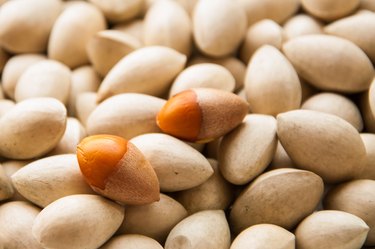
Ginkgo nuts are a type of food grown from the ginkgo biloba tree, a native Chinese plant. Both the leaves and the nuts of ginkgo biloba have been used as remedies for various health complications and to produce health supplements intended to prevent cognitive decline. While much of the current research focuses on the extract of ginkgo leaves, eating ginkgo nuts offers a number of valuable health benefits.
Lower Cholesterol Profile
Video of the Day
Ginkgo nut consumption lowers cholesterol levels, according to a study published in 2008 in "Food Research International." In the study, ginkgo nuts were fed in four different forms, including whole nuts, to mice. Mice that consumed fat-soluble portions of ginkgo nuts demonstrated lower cholesterol levels in the liver, while mice that consumed water-soluble portions of ginkgo nuts demonstrated increased serum cholesterol levels. This study indicates that the fat-soluble portions of ginkgo nuts could be useful in preventing cardiovascular disease.
Video of the Day
Protection Against Cancer
Ginkgo biloba nuts may be beneficial in preventing chronic diseases such as cancer due to their antioxidant content. Ginkgo leaf extract, which contains antioxidants known as flavonoids and terpenoids, protects the body against oxidant compounds that could otherwise cause damage to body cells and facilitate cancer development. The antioxidants in ginkgo biloba also provide anti-cancer benefits by influencing gene expression. Ginkgo nuts have been demonstrated to retain approximately 60 percent of their antioxidant content even after cooking.
Preservation of Brain Function
Alzheimer's disease and other conditions characterized by gradual cognitive decline are associated with an accumulation of fatty plaque in the brain. Ginkgo biloba extract decreases the amount of this buildup, preventing or delaying these neurodegenerative conditions. Ginkgo biloba also improves blood flow in the brain due to its effects on a hormone called norepinephrine, possibly improving cognition and memory. Studies on ginkgo biloba's effects on cognitive function have had mixed results.
Possible Negative Effects
While ginkgo nuts are frequently consumed in Japanese and Chinese cuisine, potential health complications are associated with excessive consumption. Eating excessive quantities of ginkgo nuts can lead to food poisoning due to a compound known as 4-O-methylpyridoxine, which interferes with the synthesis of GABA, a neurotransmitter in the brain.
- Food Research International: Modulation of Cholesterol Metabolism by Ginkgo Biloba L. Nuts and Their Extract
- Journal of Food Science: Multifaceted Therapeutic Benefits of Ginkgo Biloba L.: Chemistry, Efficacy, Safety, and Uses
- Food Research International: Antioxidant Capacity in Ginkgo Biloba
- Angewandte Chemie International: Chemistry and Biology of Terpene Trilactones From Ginkgo Biloba